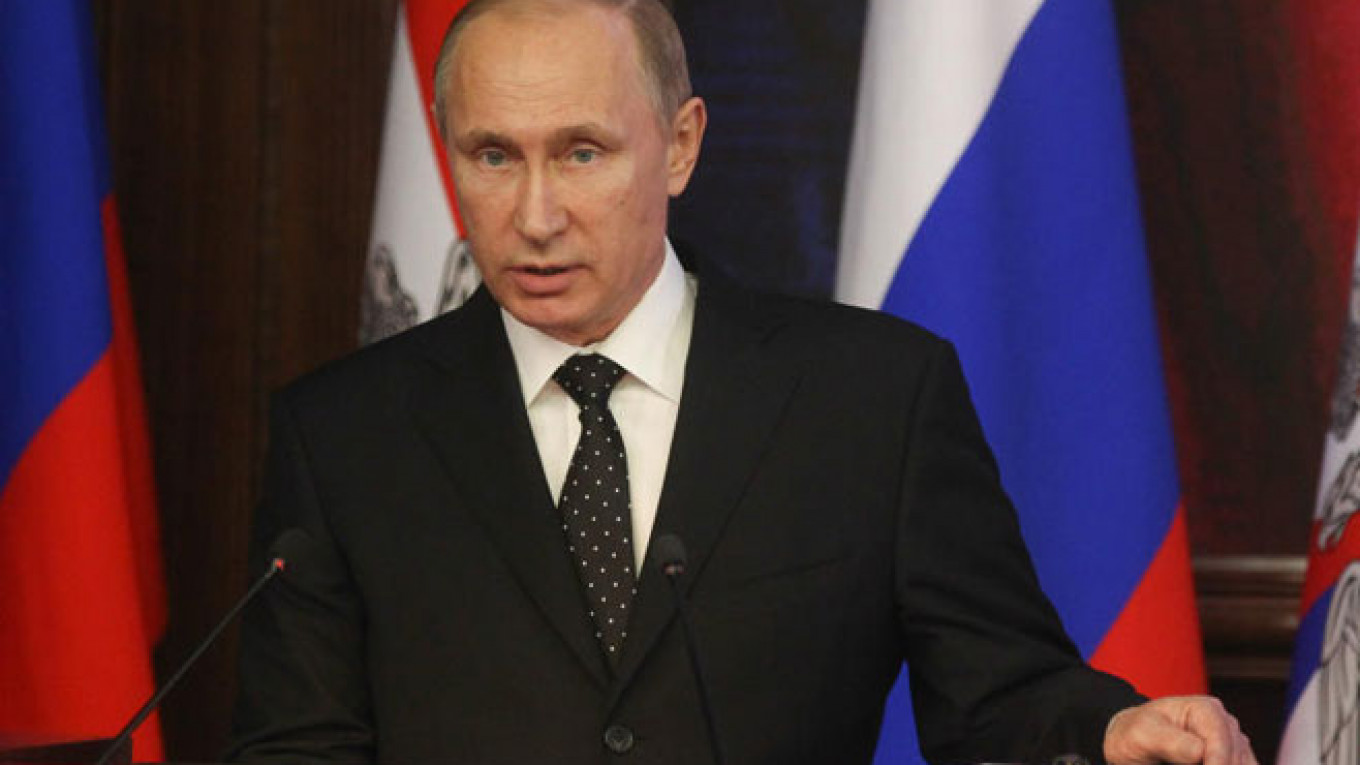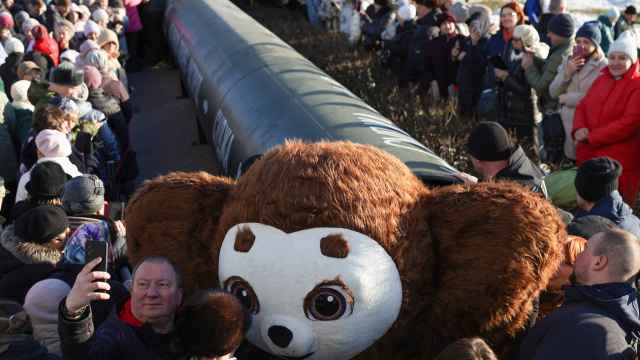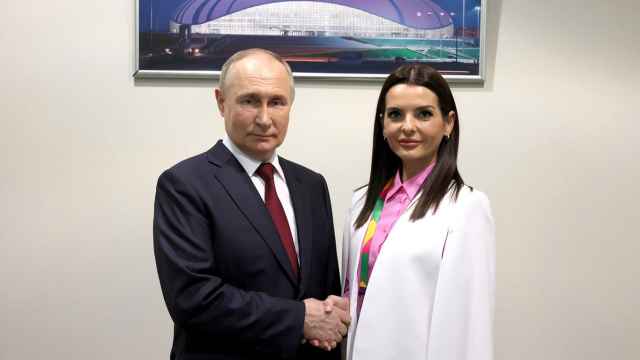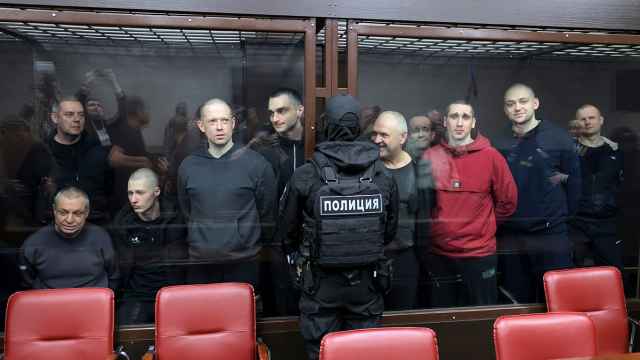Despite the ongoing confrontation with the West over Ukraine, Russian leaders still see it as the ultimate source of prestige and approval, analysts told The Moscow Times on Tuesday after readers of U.S. magazine Time named President Vladimir Putin the most influential person in the world.
Putin's victory came after heavy campaigning on the part of Ramzan Kadyrov, the leader of Russia's republic of Chechnya, who has previously slammed Western media for bias and conspiracy against himself and Russia overall.
Putin beat South Korean female rapper CL to win with 6.95 percent of the vote, Time announced Monday. Pop stars Lady Gaga, Rihanna and Taylor Swift rounded out the top five. The only non-entertainers in the top 10 apart from Putin were the Dalai Lama, Pakistani feminist activist Malala Yousafzai and Pope Francis.
"Russia's bellicose president has acquired notoriety abroad and adulation at home thanks to his rumored support for Ukrainian rebels and his annexation of Crimea last year. He continues to challenge European authority in the former Soviet states, and has stood by Syrian President Bashar Assad as the rest of the world has condemned his conduct in the civil war," Time said in one of its statements about the vote.
The online poll asked readers in late March to vote for who they thought had "changed the world this past year, for better or worse." Time did not specify how many people had participated in the poll, which allowed readers "a say" ahead of the editor-compiled list of the world's 100 most influential people that will be released Thursday.
Last year, Putin came 28th in the poll, with Indian politicians Arvind Kejriwal and Narendra Modi dominating the vote. Analysts did not rule out that Kadyrov's support could have made a difference this year, with one suggesting that some people could have been given money to vote for Putin.
"I don't exclude the possibility that this result was somehow paid for," Alexei Malashenko, a leading analyst at the Carnegie Moscow Center, told The Moscow Times in a phone interview.
According to Time, 57.4 percent of the votes were cast in the United States, followed by Canada and Britain with 5.5 and 4.6 percent respectively.
Time named Putin person of the year in 2007 and ran an extensive interview with him.
Answering a question about being awarded the title during his annual news conference in 2008, Putin said that "if I were to react to everything that is written about me and change my behavior accordingly, I do not think we would have achieved all we have today."
Chechen Support
There were no reports of Chechens being coerced to vote for Putin, but in the past, Kadyrov has managed to drum up huge rallies in support of the Russian president.
Last October, Kadyrov summoned about 100,000 people for a march in the center of the Chechen capital Grozny to honor Putin on his birthday. Public workers were given a day off, with many people forced to attend the rally, Kavkazsky Uzel (Caucasian Knot) regional news website reported at the time.
Ahead of the Time poll, Kadyrov posted five appeals on his Instagram account, which has nearly a million followers, calling on people to vote for Putin "to show how we love our national leader."
Last month, Kadyrov accused foreign media outlets of "using any excuse to blame the head of Chechnya."
"If a pedestrian crossed the street in the wrong place, Kadyrov is guilty, if someone is suspected of a crime, Kadyrov is guilty," he said at a meeting with law enforcement officers, according to his Instagram account.
Kadyrov is using the situation to earn points and show that his relationship with Putin is personal and exclusive, which is also a signal to law enforcement officers in Moscow who are irritated with him, Malashenko said.
"Ramzan has a very highly developed political instinct that doesn't fail him," he said.
Last year, Kadyrov told The Daily Beast news website "As long as Putin backs me up, I can do everything — Allahu akbar! [God is great]"
Following the Time vote, Kadyrov suggested the prominent publication was a credible platform to identify the most influential person in the world.
"We have proven again that there isn't a more authoritative leader in the world than Vladimir Putin," Kadyrov wrote on Instagram after Time closed the voting.
Added Value
While it might seem at odds with modern Russia's patriotic rhetoric to cite a foreign magazine as proof that Putin is the most authoritative leader, according to Malashenko, members of the Russian elite understand well that "authority and influence are made in the West."
"If his rating was low, Nikolai Patrushev [secretary of Russia's Security Council] would say that the Americans are doing their best to humiliate Russia," he said.
According to Alexei Makarkin, deputy head of the Center for Political Technologies, a Moscow-based think tank, Western opinions of Putin are more important for the Russian elites that domestic ones, as they are regarded as more objective.
"Things like the Time 100 list are more important than the approval ratings produced by Russian pollsters," Makarkin said in a phone interview.
According to a March poll conducted by the independent Levada Center in Moscow, 85 percent of Russians support Putin's actions despite the fall in their real incomes.
The poll was conducted among 1,600 people with a margin of error not exceeding 3.4 percent.
"Even when people say that they don't like the West and see it as an enemy, mentally and culturally they still see it as the ultimate point of reference," Makarkin said.
"For instance, even fans of Stalin mention Churchill's praise of him to try to prove their point," he said.
Contact the author at i.nechepurenko@imedia.ru
A Message from The Moscow Times:
Dear readers,
We are facing unprecedented challenges. Russia's Prosecutor General's Office has designated The Moscow Times as an "undesirable" organization, criminalizing our work and putting our staff at risk of prosecution. This follows our earlier unjust labeling as a "foreign agent."
These actions are direct attempts to silence independent journalism in Russia. The authorities claim our work "discredits the decisions of the Russian leadership." We see things differently: we strive to provide accurate, unbiased reporting on Russia.
We, the journalists of The Moscow Times, refuse to be silenced. But to continue our work, we need your help.
Your support, no matter how small, makes a world of difference. If you can, please support us monthly starting from just $2. It's quick to set up, and every contribution makes a significant impact.
By supporting The Moscow Times, you're defending open, independent journalism in the face of repression. Thank you for standing with us.
Remind me later.






